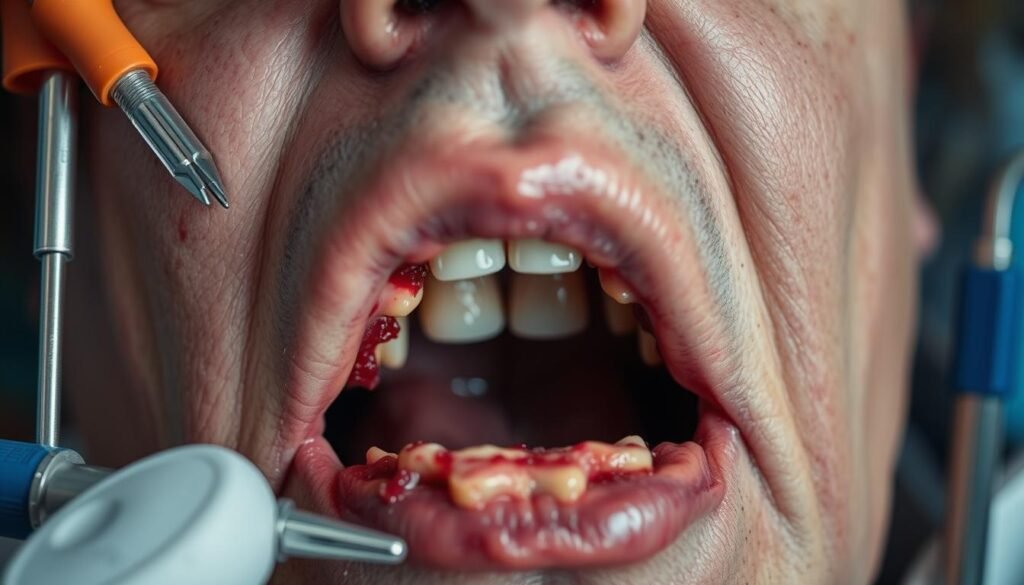Up to 85% of cancer patients might struggle with malnutrition during their treatment. This highlights the issue of lung cancer taste in mouth. It’s a problem that can change what a patient eats and their life quality. Known as dysgeusia, this condition changes how things taste. It can be tough for those with lung cancer and their caregivers.
Changes in taste, often due to chemotherapy and radiation, impact eating enjoyment and may signal other health issues. Spotting these cancer symptoms helps manage them and keep up good nutrition during lung cancer treatment. For tips on dealing with taste changes, check out this informative page.
Key Takeaways
- Understanding dysgeusia is crucial for lung cancer patients experiencing taste changes.
- Early recognition of oral symptoms can assist in managing nutritional intake.
- Malnutrition is a common concern, affecting a significant percentage of cancer patients.
- Chemotherapy and radiation often lead to alterations in taste perception.
- Support from caregivers and healthcare teams can alleviate the impacts of taste changes.
- Practical strategies exist to manage changes in taste and enhance nutritional health.
Understanding Dysgeusia and Its Connection to Lung Cancer
Dysgeusia is when people’s taste sensations change, often seen in lung cancer patients. It can come from the cancer, chemotherapy, and radiation. These methods of treatment mess with how we taste. They also mess with taste receptors, causing odd flavors, like a metallic taste.
About half of all cancer patients on medication note changes in taste. These changes may be due to the disease or treatment. In lung cancer, certain substances can alter how things taste. This may make food taste weird or bad.
Dysgeusia is common in lung, nasopharyngeal, and sinonasal cancer patients. For example, 20% of people with sinonasal cancer experience major taste changes, even before treatment. Chemotherapy drugs like Cisplatin and Cyclophosphamide are known to cause a metallic taste. This shows the connection between treatment and changes in taste.
If taste changes are big, patients should talk to their doctors. Handling dysgeusia early helps avoid issues like weight loss and poor appetite. Knowing how lung cancer and dysgeusia connect is crucial. It helps provide well-rounded care throughout treatment. For more on taste and smell changes in cancer patients, see the study here.
The Various Tastes People Experience with Lung Cancer
People with lung cancer often notice changes in how food tastes. This can lead to less enjoyment and worry about getting proper nutrition. It’s key to understand and manage these taste changes during treatment.
The most common taste changes are metallic, bitter, and sour. These can make eating less appealing.
Metallic Taste: A Common Complaint
Many lung cancer patients report a metallic taste. It’s like tasting pennies. Studies show about 78% of patients getting cancer treatments experience this. Keeping the mouth clean by brushing often might help.
Bitter and Sour Tastes: What to Expect
Bitter and sour tastes are also issues for lung cancer patients. Favorite foods might start to taste very bitter or sour. This is especially true for meats. These changes can make eating hard and decrease calorie intake. It’s important for patients to notice these changes and adjust their diets to keep up their nutrition. Recognizing taste changes early on helps with managing health. Knowing early signs is crucial.
Unusual Sweetness: A Surprising Symptom
Some lung cancer patients might find things taste unusually sweet. This is unexpected and can lead to more taste issues. It shows how complex taste changes, or dysgeusia, can be in lung cancer. Understanding these changes helps people deal with them and find ways to enjoy food again.
| Taste Change | Description | Frequency in Lung Cancer Patients |
|---|---|---|
| Metallic Taste | Described as tasting like metal or pennies. | 78% |
| Bitter Taste | Foods, particularly meats, taste more bitter. | 23% experiencing increased bitterness |
| Sour Taste | Foods may have an exaggerated sour flavor. | 17% experiencing increased sourness |
| Unusual Sweetness | Some patients may notice a surprising sweetness. | 27% experiencing increased sweetness |
It’s important to track taste changes and talk about them with healthcare teams. This helps get the right advice and support during treatment.
Lung Cancer Taste in Mouth: Causes and Triggers
It’s crucial to understand why taste changes happen in lung cancer patients. Many factors make dysgeusia, or taste changes, more likely during treatment. Chemotherapy and radiation therapy play big roles in changing how patients taste food. This makes eating a challenge.
Impact of Chemotherapy on Taste
Chemotherapy drugs change how things taste by impacting taste buds. Patients might find food tastes weird, leading to not wanting to eat. This situation can be upsetting and may cause weight loss. Talking to doctors about these taste changes is important. They need to know about any metallic or overly sweet tastes.
Radiation Therapy and Its Effects on Taste
Radiation to the head and neck affects taste too. It can cause a dry mouth and change saliva, making flavors harder to enjoy. These side effects are common and can reduce the joy of eating. Working with a cancer care team can help find ways to manage these issues.
The Role of Mouth Sores and Dry Mouth
Mouth sores and dry mouth are big problems for patients with lung cancer. They can really change how foods taste, making it hard to eat well. It’s important to handle these issues to improve life quality.
Managing Mouth Sores During Treatment
Mouth sores can hurt a lot because of chemotherapy and radiation. Rinsing with baking soda and salt water helps soothe these sores. It’s best to stay away from alcohol-based products to avoid more irritation.
Over-the-counter pain relief can also help make eating easier. This makes dealing with the sores a bit more bearable.
How Dry Mouth Influences Taste Perception
Dry mouth is common after radiation therapy for lung cancer patients. It can make the mouth feel sticky and interfere with eating and tasting. Drinking water often or sucking on sugar-free lozenges helps a lot.
If not managed, dry mouth can lead to tooth decay and infections. Regular dentist visits are key during treatment.

How Changes in Taste Affect Nutritional Intake
Many lung cancer patients face changes in their sense of taste due to chemotherapy. Up to 98.3% of patients report this issue. This makes it hard for them to enjoy food, putting them at risk of malnutrition.
Age, gender, level of education, and physical health can affect the severity of taste changes. Side effects like nausea and a dry mouth also make eating difficult.
Malnutrition Risks for Lung Cancer Patients
Lung cancer patients with taste disorders are more likely to face malnutrition. About 31.7% are at high risk due to altered taste perceptions. These changes impact their intake of calories, protein, vitamins, and minerals. These nutrients are key for staying healthy during cancer treatment. Patients should aim to keep up their calorie intake, despite the taste changes.
Strategies to Maintain Nutritional Health
To deal with changes in taste, patients can try several strategies. Adding tasty flavors can boost appetite. Some suggestions are:
- Exploring different foods and recipes to satisfy specific tastes.
- Adding sauces, spices, and seasonings, like soy sauce or vinegar, to improve taste.
- Choosing foods that look good, with a variety of colors and textures, to make meals more appealing.
- Opting for other protein sources such as beans, eggs, and fish if meat doesn’t taste good.
- Keeping food safe to eat is important, especially for those with weakened immune systems.
Talking with a dietitian can help patients create meal plans that suit their taste changes and nutritional needs. Being proactive can help lung cancer patients stay healthy despite taste changes.
Physical and Emotional Impacts of Taste Changes
Changes in taste can greatly affect physical health and emotional well-being in lung cancer treatment. These changes often lead to significant emotional impacts. Suddenly, eating becomes a source of frustration and stress. Many people lose their appetite or start to dislike foods they once loved.
This shift in taste perception isn’t just physical; it makes eating healthy hard. Keeping a balanced diet becomes challenging. This affects overall nutritional health.
Emotional Response to Changes in Taste
The emotional effects of taste changes are deep. Patients often feel sad and alone, especially when food doesn’t bring joy anymore. Not recognizing flavors or tasting unpleasant ones, like metallic, adds to distress. These emotional challenges can make recovering from illness even harder.
It’s crucial for individuals to find ways to handle these feelings. They must tackle these emotional challenges head-on.
Coping Mechanisms for Taste Alterations
To deal with the emotional effects of taste changes, certain strategies help. Joining support groups provides a sense of community. It helps patients share their experiences and feel understood. Seeing mental health professionals can also offer emotional support specific to one’s needs.
Good oral hygiene and choosing more flavorful foods can make eating easier. Talking openly with healthcare providers improves support. This approach addresses both physical and emotional challenges of taste changes.

Communication with Your Healthcare Team
Talking openly with your healthcare team is key in handling lung cancer symptoms, like taste changes. It’s important for patients to feel comfortable talking about any taste changes with their oncologists. This can help them understand why these changes happen and how to treat them.
Discussing Taste Changes with Oncologists
Oncologists can explain how cancer treatments affect taste. They can talk about how chemotherapy and radiotherapy lead to taste changes. They can also share ways to lessen these issues. Good communication helps patients and doctors work together to manage side effects.
Seeking Support from Dietitians and Nutritionists
Dietitians and nutritionists play a big role in helping patients with taste changes. They make diet plans that reduce the impact of taste loss and ensure patients get enough nutrients. With their help, meal planning becomes better and eating can be enjoyable again.
Working together with your healthcare team, including oncologists and dietitians, can greatly improve your life. For more details on how healthcare pros can help with taste changes, read this study here.
Practical Tips for Managing Changes in Taste
Dealing with taste changes can be tough for those in lung cancer treatment. There are handy tips to make food taste better and improve eating. These include rinsing the mouth before eating and trying new ways to cook food. These can really help.
Rinsing Techniques to Enhance Flavor
The right mouthwash can make food taste better. Baking soda and salt water, or diluted lemon juice can cut down on bad tastes. It’s easy to make this a part of your day. Here’s how you do it:
- Mix a teaspoon of baking soda with one glass of water.
- Add a pinch of salt to the mixture for additional cleansing properties.
- Rinse the mouth thoroughly for 30 seconds before meals.
Food Pairing and Preparation Tips
Choosing and cooking food the right way can help with taste changes. Trying different flavors can bring back the fun of eating. Here are some tips on how to do this:
- Incorporate sweet marinades for meats, such as honey or teriyaki sauce, to balance out bitter notes.
- Add tart flavors like citrus or vinegar to enhance overall flavor complexity.
- Prepare foods at room temperature to minimize taste alterations that may occur during cooling.
- Utilize plastic utensils, which can reduce metallic flavors that affect the eating experience.
These strategies help patients deal with taste changes better. This makes preparing and enjoying meals more pleasant.

| Food Item | Flavor Pairing | Preparation Method |
|---|---|---|
| Chicken | Honey-Mustard Glaze | Grilled or Roasted |
| Fish | Lemon-Dill Sauce | Baked or Steamed |
| Vegetables | Vinegar-Based Marinade | Roasted or Grilled |
| Rice | Herb Infused | Steamed or Pilaf |
Treatment Options to Alleviate Taste Changes
Lung cancer patients often deal with dysgeusia, which means their taste perception changes. This can really impact their happiness and life quality. Luckily, there are many treatments available to help with these taste issues.
Medications to Manage Dysgeusia
Several medicines can ease the taste changes that come with treatment. Mouth rinses and other oral treatments can help with dysgeusia. These treatments focus on problems caused by cancer therapies like chemotherapy, which often changes how things taste. In fact, about 80% of lung cancer patients on chemotherapy experience taste changes, so it’s important to manage this.
Complementary Therapies for Symptom Relief
Besides medicines, there are other ways to feel better. Things like acupuncture and relaxation methods can improve life for lung cancer patients. Herbal treatments may also help with taste changes. Talking regularly with healthcare professionals can help patients find these options. This can lead to better eating habits and overall well-being.
It’s crucial to keep eating well, especially since about 60% of lung cancer patients struggle with eating because of taste changes. Mixing medicine with other therapies can help patients handle their symptoms. This way, they can lessen the effects of dysgeusia in their day-to-day life.
| Treatment Options | Effectiveness | Beneficial For |
|---|---|---|
| Medications | Target symptoms directly | Patients undergoing chemotherapy |
| Acupuncture | Symptom relief | Patients seeking holistic options |
| Herbal Remedies | May enhance taste perception | Patients with specific dietary preferences |
| Dietitian Consultations | Helps adjust food choices | Patients battling taste changes |
| Mouth Rinses | Alleviate bad tastes | General management of dysgeusia |
Conclusion
Dealing with taste changes when you have lung cancer is very important. It helps you stay healthy and feel good. Many people, about 38%, notice changes in how things taste and smell. This can make them not want to eat. Knowing about these changes and finding ways to deal with them is key.
Talking to your doctor about any taste changes is crucial. It lets you work together to come up with solutions. Making small changes in what you eat can also help a lot. This way, you can keep enjoying your food and stay healthy.
To handle taste changes well, you need to be aware and get support. It’s all about eating right and talking to your doctors. This helps you deal with your health issues while still enjoying your meals.